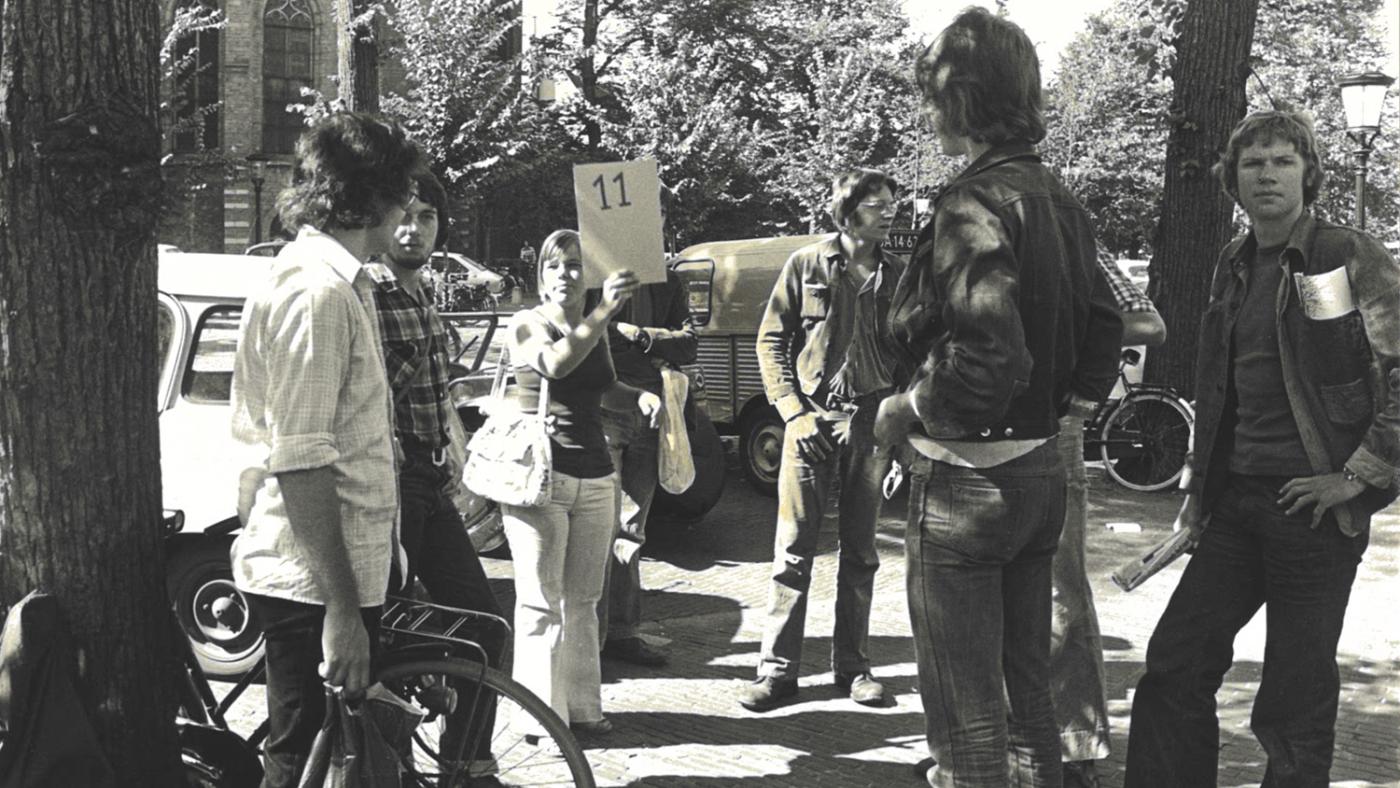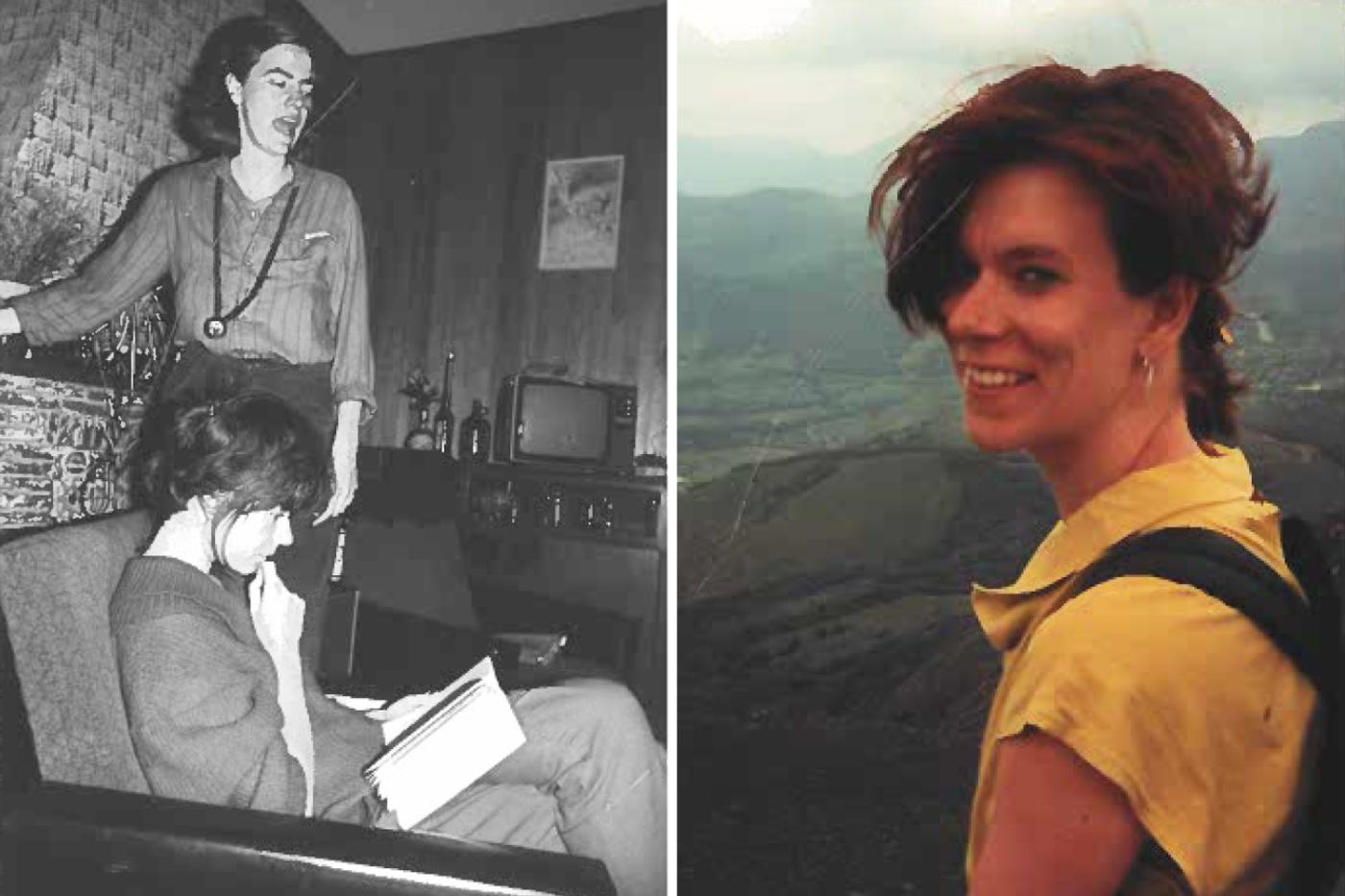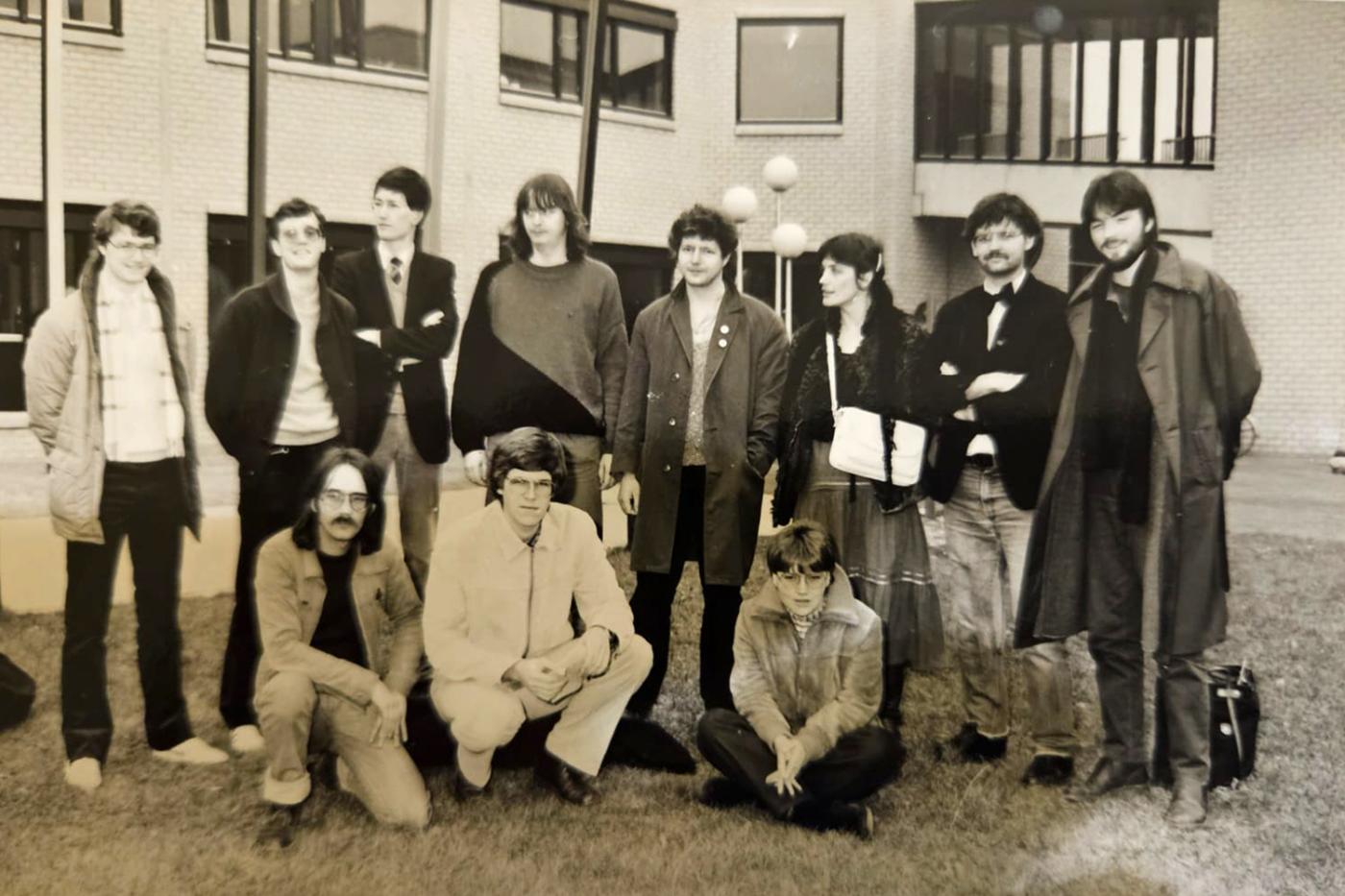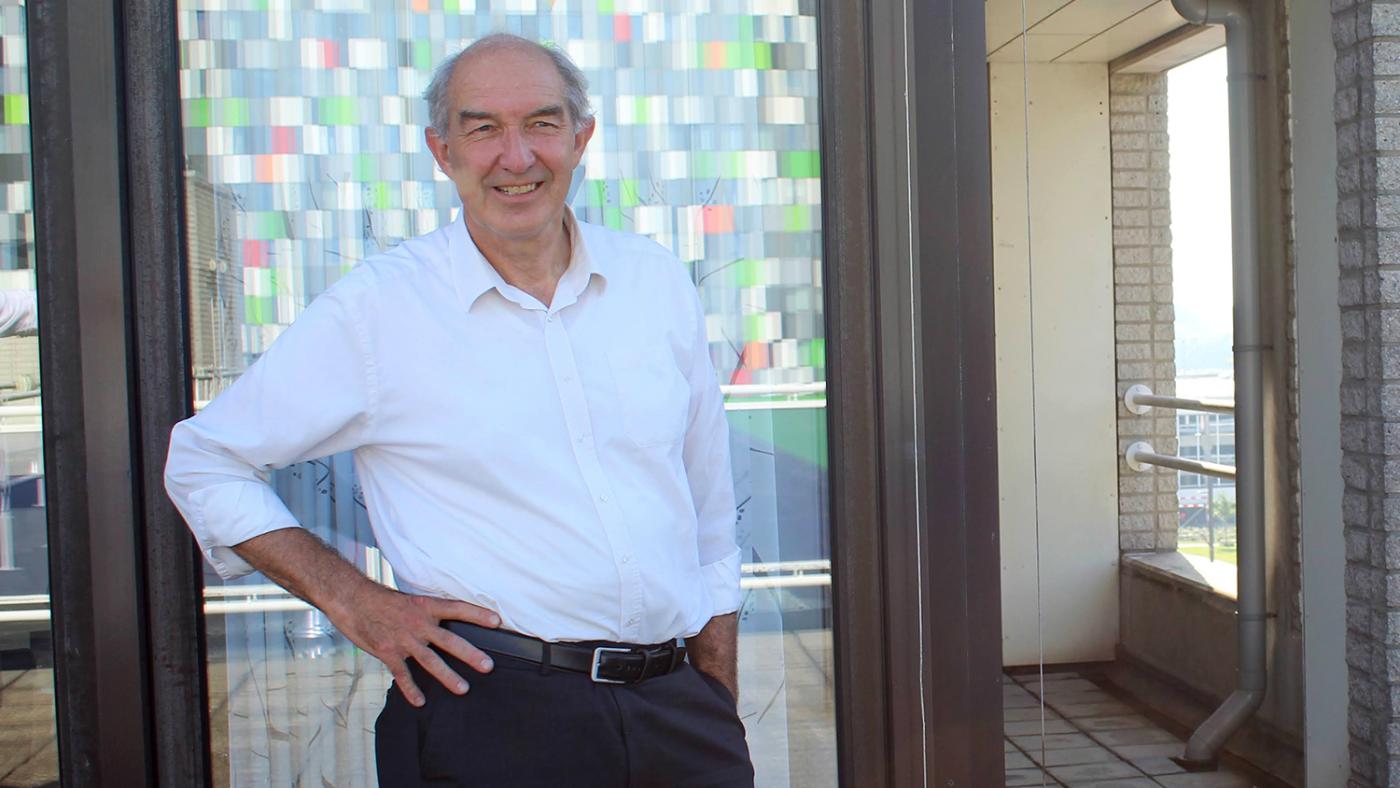UU Executive Board reminisces about their time at university
‘I felt very privileged to be allowed to go to college’

Who are the three people running Utrecht University? Most students don't care and that's not a bad thing, says Anton Pijpers, chair of the Executive Board. "Most students are more likely to turn to their own programme or department when they have questions or problems. They only know where to find us when they want to protest our policies. And then they might think: ‘Who are these people anyway’?"
UU President Anton Pijpers (1958), Vice-president Margot van der Starre (1961) and Rector Henk Kummeling (1961) sway over 9,000 staff and 40,000 students. The trio is responsible for the entire ins and outs of the university. When one of their measures is unpopular, some people sigh, wondering whether they have forgotten what it is like to be a student. But that does not appear to be the case.
Known as the "lost generation", those born in the 1960s studied in the 1980s, a time marked by a significant housing shortage, an extremely active squatting scene, an economic crisis, rampant youth unemployment and many protests. There were massive demonstrations against cruise missiles and nuclear power. Janse Bagge Bend shot into the charts with the hit Solliciteren (which translates as "Job Application") and Klein Orkest did the same with Koos Werkeloos ("Koos, unemployed"). At the time, Ruud Lubbers, from the Christian Democratic Party, was the prime minister and the Christian Democrats formed a cabinet with the centre-right party VVD.
When they were university students, the Executive Board members had a choice between two Dutch TV channels. All students in a house shared the same phone line and the duration of each call was tracked with a ticker. They had no basic student grant (a monthly allowance from the government, Ed.) nor did they get a discount on public transport. Students received scholarships through their parents' "child allowance" or took out loans. There was no limit on the number of years one could study for and many students were in no hurry to graduate either, considering they were basically being trained to be unemployed.
Anton Pijpers started studying Veterinary Medicine at UU in 1976. Rector Henk Kummeling went to Nijmegen in 1979 to study Law. Vice-president Margot van der Starre began her studies in the Dutch language at the University of Amsterdam in 1979. She took two years longer to graduate than usual. "It was quite normal to do it back then. I was a relatively a fast student," she says.

Anton Pijpers studeerde in Utrecht Diergeneeskunde. Helaas heeft hij geen foto meer uit die tijd. In het DUB-archief vonden we wel een foto van de introductie uit zijn eerste jaar.
Anton Pijpers: 'I was used to training six days a week ; I didn't make time for parties'
It would have been funny if the three of them had met while studying, but they frequented very different circles. Pijpers was an avid skater and trained almost daily in the hope of becoming good enough for a professional team. Kummeling dabbled as a singer and keyboard player in a band to earn money and would often hang around a Nijmegen pub on weekday evenings. Van der Starre befriended squatters, feminists and Rajneesh followers and had a busy cultural life. She played the flute, took courses at Crea (Amsterdam's Parnassos), and had all kinds of side jobs.
"If I was a boring student?", Pijpers laughingly says, as his college life consisted mainly of sports and studying. "Yeah, maybe I was. But I was also interested in society. I was well-read and read the newspaper every day, but I was used to training six days a week since secondary school and I did that until halfway through my studies. I didn't make time for parties, pubs or protests."
Kummeling and Pijpers are both first-generation students, the first in their families to go to college. They both felt very responsible towards their parents, so they strived to finish their studies within the allotted time. And they have, as learning came easily to them. Pijpers: "I felt so privileged to study and have the freedom to do what I wanted. My little brother started working when he was 16 and had to pay taxes. Money from which my scholarship was paid. My parents also contributed, so I felt like I shouldn't take too long to graduate."
Margot van der Starre: 'My father was a French professor in Leiden. I wanted to study somewhere where people didn't know him'
Kummeling felt the same kind of responsibility. "I took five years to graduate and never thought for a moment about taking longer than that." His parents could not help him financially and the "interest-free advance" he received was not high enough to live on. "So, I had to work alongside my studies. When I was in high school in Zevenaar, I started a band because I wanted to save money to take driving lessons when I turned 18 and go to college. I was a singer and keyboard player. I signed up for Utrecht and Nijmegen. Back in those days, law students were assigned somewhere. I was hoping for Nijmegen, so I could continue with the band. We played the songs people requested at parties and celebrations. But I didn't want to make a career as a musician. The moment I graduated, I quit the band."
Pijpers is the child of a housewife and a teacher, while Kummeling was born to a "typical Catholic housewife" and a father who started working as a rust crabber in a boatyard at the age of 14. Pijpers grew up in the Christian town of Ermelo, in the Veluwe region, while Kummeling grew up in the village of Pannerden, near the German border. Margot van der Starre comes from an academic family and grew up in the suburbs. "My father was a French professor in Leiden. My mother taught classical languages. I wanted to study somewhere where people didn't know my father. Amsterdam is a city with a lot of theatres, art and culture, which attracted me. My parents paid for my tuition fees and rent, and I also got a little allowance. I realise that's a big deal, but I had to work alongside my studies as well. I had several jobs. My parents always said I had to be economically independent."

Margot van der Starre when she was a student. Photo: private collection
Henk Kummeling: 'I even took part in an occupation, but I would call it a light version'
None of the Executive Board members was part of a student association. Pijpers occasionally visited Veritas and when he failed to become a top skater, he joined the Veterinary Medicine study association, DSK. "I joined the party committee. The parties were legendary. In those days, it was still in the city centre and the police would come quite often because the neighbourhood complained about the noise." Most of his friends were from DSK or cycling enthusiasts.
Kummeling soon found like-minded people with whom he enjoyed going to the pub, playing music and going to festivals. He soon became active in several organisations. For example, he was the president of the Human Rights Study Association, served on the faculty council and was also an assessor to the faculty board. Van der Starre was not a member of anything. "That was not something you did at the time, so I didn't intend to do it when I started studying."
In Amsterdam, she made friends who belonged to leftist groups such as squatters and feminists, as well as Bhagwan followers. "Personally, I did not belong to anything, I was more of a contemplator. But I found those worlds very interesting, we had great conversations. After a few years, I lived in a house from a feminist housing group. It was so radical that they actually thought that women should not have relationships with men. I wasn't feminist enough in their eyes because they thought I was spending too much time with my boyfriend."
Although she took longer to graduate than usual, she was a serious student. "I liked studying. I studied Dutch first and then specialised in text science, the technical side of language. That was what made me tick".
In his third year, Kummeling moved in with his girlfriend in Arnhem. Things didn't work out in Nijmegen, where he fought against the educational and administrative policies of Radboud University. "I even took part in an occupation calling for the quality of education, but I would call it a light occupation. We went home at the end of the day. Back then, associate professors still had a say in the appointment of professors. When I was on the faculty council, we made sure that a professor who performed poorly left the university. I am still proud of that."
Henk Kummeling: 'If you want to get good ideas on the table, you must give others space to come up with those ideas'

Henk Kummeling (at the right) as a member of the faculty council. Private collection
Although all three have jobs they were not trained for, they say they still benefit from what they learned at university. After graduating, Pijpers worked as a veterinarian, going through crises such as foot-and-mouth disease, bird flu and bluetongue disease. After a few years, he returned to Utrecht where he obtained his PhD and became a professor. In 2000, he left the position to work in the private sector. At the Animal Health Service, he managed several veterinary epidemics. He returned to UU in 2009 to become the dean of the Faculty of Veterinary Medicine. "One thing I've inherited from my studies and sports experience is my ability to handle stress well and take setbacks. Veterinarians and top athletes must both be able to reflect on their performance and how they could improve. I still do that as an Executive Board chair."
When Van der Starre graduated, there was no demand for a linguist. Uninterested in pursuing a scientific career, she became a substitute Dutch teacher in a high school. After a few years, the business side attracted her. "My education has helped me a lot with everything I've done. I've learned to think logically and analytically, I've learned to be consistent. In my current job, one should be able to tell a clear story, and I've learned how listening and communication work, something that still comes in handy every day. What I also learnt from my studies is that men and women are equal and women should be economically independent."
The rector was gripped by politics at a young age. Hence his choice of law and the decision to specialise in human rights and power structures. He is probably the one most traditionally prepared for the position of a university administrator. He was the president of the Human Rights Study Association, a student member of the Law Faculty Council and a student assessor to the Law Board. "A professor saw me and encouraged me to pursue research. He offered me a PhD position before I graduated. I was very interested in that because I did not want to become a lawyer or a judge. That professor was a member of the faculty council too. Back then, it was common for employees to vote along with the professors, but he was the one who welcomed different ideas and went against customs. In that sense, he was an example to me. If you want to get good ideas on the table, you must give others space to come up with those ideas."
Margot van der Starre: 'The idea of a fine to penalise students who take longer to graduate is terrible'
The trio looks back fondly on their college years and would not take anything back. Although students today must also deal with a housing shortage and activism is flourishing again, they say the zeitgeist is very different now. They are worried, seeing what today's students face. Van der Starre: "The idea of a fine to penalise students who take longer to graduate is terrible. If I had had to deal with that, my parents would have paid it, but by no means every student is that lucky. Such a fine can really get in the way. It may make students decide not to go abroad on exchange or explore life in other ways."
Pijpers still remembers the first meeting he had about students' stress, a few years ago. "The students told us that this stress was caused by being constantly in touch with everything and everyone through their smartphones. It also has to do with the plethora of options and choices they must make and the pressure to have a nice-looking CV. I saw it in my own daughters when they were studying. I wish students would worry less about those things. Most of them are smart and sensible enough to get ahead even without an impressive CV. I'm sure there was stress back in our time, but it wasn't as prominent."
Kummeling appreciates that UU students can take classes outside their own disciplines today, something he would have liked to do. In addition, he feels bad that students feel as though they can't afford to make any mistakes. "It's okay to make mistakes, we learn from them. I have done so many things in my life that made me fall flat on my face. Those are experiences you take with you."
Did you know...?
Anton Pijpers

- Pijpers did three years of grammar school and then switched to atheneum to have more time for skating.
- Undecided between medicine and veterinary medicine, he chose the latter because it fit his surroundings better.
-Got rooms in Parkstraat (2 x 2.5 m) and after a few years had an entire floor to himself, sharing the rest of the house with a landlady.
-Joined the DSK study association as a fourth-year student
-Studied for about 7 years in total because "you had to wait a while before you could start doing internships"
-Listened a lot to The Rolling Stones
-Rarely watched TV then and still does it seldom now, but he makes an exception for certain cycling races.
-Reads a lot and prefers poetry to novels. "You can read poems faster and then reread them."
-Still cycles with the friends he made as a student. "We had a group of ten people and eight are still alive. Cycling in the Alps is the most beautiful thing there is."
-Paid off his scholarship when the government gave graduates a discount on the total amount owed. "I was working by then, so I could pay it off."
Margot van der Starre

-Did grammar school in Leiden. Played theatre and flute.
-Chose Dutch because she got good grades in this subject at high school. "I really liked geography and could have studied Social Geography if I hadn't had an annoying teacher in the last year of high school."
-Liked listening to Patti Smith and went out dancing at the "Bhagwan disco" Zorba the Buddha, in Amsterdam.
-She found her first room while at the hairdresser's. The person in the chair next to her knew someone who was renting a room. "One needs a network to find a room," she says. "But it was a terrible room, very noisy. I often couldn't study or sleep there."
-After two years, she moved to another building with other students and got a room with a seven-metre-wide balcony. "It was a godsend. I feel sorry for students living in bad rooms because I know what it's like. Housing is an issue close to my heart."
-Her boyfriend lived 100 metres down the same street and they started living together after she graduated. They are still together and live near Utrecht.
-She still remembers Beatrix's coronation on April 30, 1980. "I was on my way to meet my friends in a squat that day. We were supposed to celebrate Queen's Day together, but I never got there. I had to go from the Plantage neighbourhood to Zuid and cross the Blauwbrug to do so. But the riot police stood on one side and squatters on the other. Things got tense, so I just went back home." They were chanting "no housing, no coronation".
-Had several side jobs, from shop assistant at a bakery to cleaner and nanny.
-She read and still reads a lot.
-Must have a walk every day. "My husband jokes that I need to be walked."
Henk Kummeling

-Went to school in Zevenaar.
-He founded a band at school. He did vocals and played the keyboard. The band did not have a name. They played songs on request. Personally, he liked listening to The Cure.
-Signed up for Utrecht and Nijmegen and was placed in Nijmegen.
-Took 5 years to study law in Nijmegen.
-Had to take a resit exam only once, which he describes as an "etching experience."
-Was a member of the faculty council and a student assessor. He joined the faculty council again as a PhD candidate.
-He married the girlfriend he moved to Arnhem for. They have been married for forty years.
-Reads a lot. He is always reading two books at the same time: fiction and non-fiction, light and heavy topics. "When I get tired of incest and manslaughter, I read something else for a while".-
Watches TV selectively. Occasionally watches football with the radio on and a book on his lap.